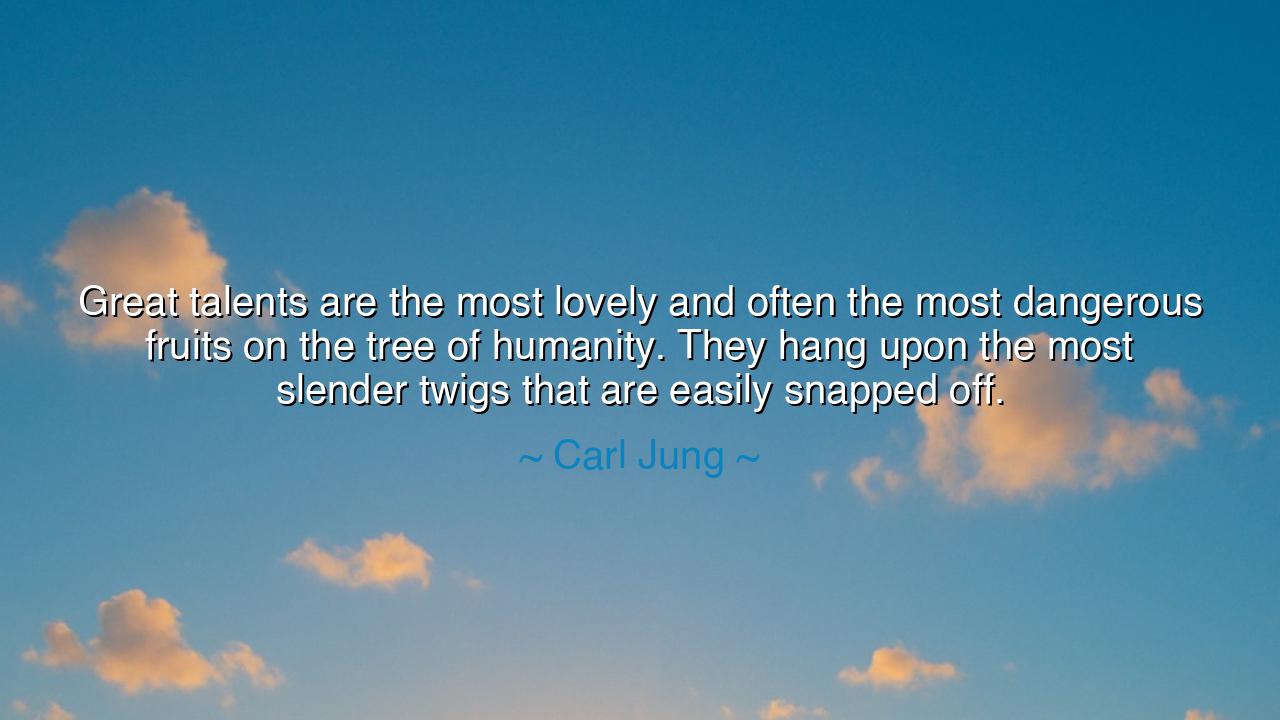
Great talents are the most lovely and often the most dangerous
Great talents are the most lovely and often the most dangerous fruits on the tree of humanity. They hang upon the most slender twigs that are easily snapped off.






"Great talents are the most lovely and often the most dangerous fruits on the tree of humanity. They hang upon the most slender twigs that are easily snapped off." — Carl Jung
In this haunting and poetic reflection, Carl Jung, the great Swiss psychologist and philosopher of the soul, speaks to the mystery and fragility of genius. He compares great talents to the most exquisite and perilous fruits of the human tree—beautiful to behold, nourishing to the spirit, yet precariously balanced upon fragile branches that can break with the slightest strain. His words echo with both admiration and sorrow, for Jung knew that those who possess extraordinary gifts often walk the edge between brilliance and ruin. The tree of humanity bears many fruits—ordinary, steady, enduring—but the rarest among them shine with a divine light that both illuminates and consumes.
The origin of this quote arises from Jung’s lifelong study of the human psyche, where he observed that greatness often comes at a cost. In his work with artists, visionaries, and thinkers, he saw that the same forces that grant profound creativity also open the door to inner turmoil. The mind that sees deeper into the mysteries of existence also feels more keenly the weight of them. Thus, the slender twig upon which great talent rests symbolizes the delicate balance between genius and destruction. One strong wind—of pride, despair, or exhaustion—can shatter what once seemed unshakable. Jung’s words are not a warning against greatness, but a plea for reverence: that we honor and protect those whose gifts expose them to such peril.
The loveliness Jung describes lies in the beauty that great talents bring to the world—their music, their inventions, their visions, their truths. These are the fruits that feed generations, that lift humanity toward the divine. But he calls them also dangerous, for they tempt both the gifted and those who admire them toward extremes. The artist may become enslaved to his art, the thinker may be consumed by his own insight, the leader may mistake his light for the sun itself. History is full of such tragic fruit that ripened too quickly or fell too soon. Vincent van Gogh, who painted the heavens as though his soul were aflame, was one such fruit—brilliant beyond measure, yet broken by the very sensitivity that made his genius possible.
Jung’s image reminds us that creation and destruction are twin forces intertwined. The higher one climbs toward greatness, the more fragile the branch beneath them becomes. Consider Friedrich Nietzsche, another thinker who peered too deeply into the abyss of human meaning. His words reshaped philosophy, yet his mind, stretched beyond mortal limits, finally broke. Like a fruit too heavy for its stem, his brilliance snapped the branch that bore it. These are not merely tragedies; they are parables about the price of illumination. Those who shine most brightly often burn the quickest, for light and shadow share the same source.
But Jung does not speak only of danger—he speaks also of reverence and understanding. The tree of humanity thrives when it tends to its most delicate branches. Just as a gardener supports the weight of precious fruit, so must we, as a people, protect those who bear the burden of genius. The great talents among us must be nurtured, not idolized; guided, not exploited. Their fragility is not weakness—it is the cost of vision. The ancient Greeks knew this truth well, calling the creative spirit daimon, a divine madness that must be balanced by discipline and care. To bear great talent is to live in constant dialogue between the human and the divine.
And yet, the lesson extends beyond the few who are deemed extraordinary. For each of us, in our own measure, bears a branch of potential. We all carry within us the seeds of creativity, insight, and passion. But the greater our gift, the greater our need for grounding. The roots of humility, rest, and love must grow deeper as the branches of ambition reach higher. The strong tree does not only reach toward the heavens—it anchors itself firmly in the earth. Thus, Jung teaches us that to sustain greatness, one must also nurture simplicity; to protect brilliance, one must cultivate balance.
So, my child of the future, remember this wisdom: admire the fruit, but tend to the branch. If you are gifted, walk gently with your gift; do not let it drive you to despair or pride. Surround yourself with those who strengthen your roots, who remind you that you are not the fruit alone but the tree itself. And if you encounter others whose light burns fierce and wild, do not envy them—care for them. For as Carl Jung reminds us, great talents are both blessing and burden, the loveliest and most perilous of all human creations. They are the fragile proof that within every mortal dwells something divine—and that even the most radiant fruit must depend upon the slender twig that holds it.






AAdministratorAdministrator
Welcome, honored guests. Please leave a comment, we will respond soon